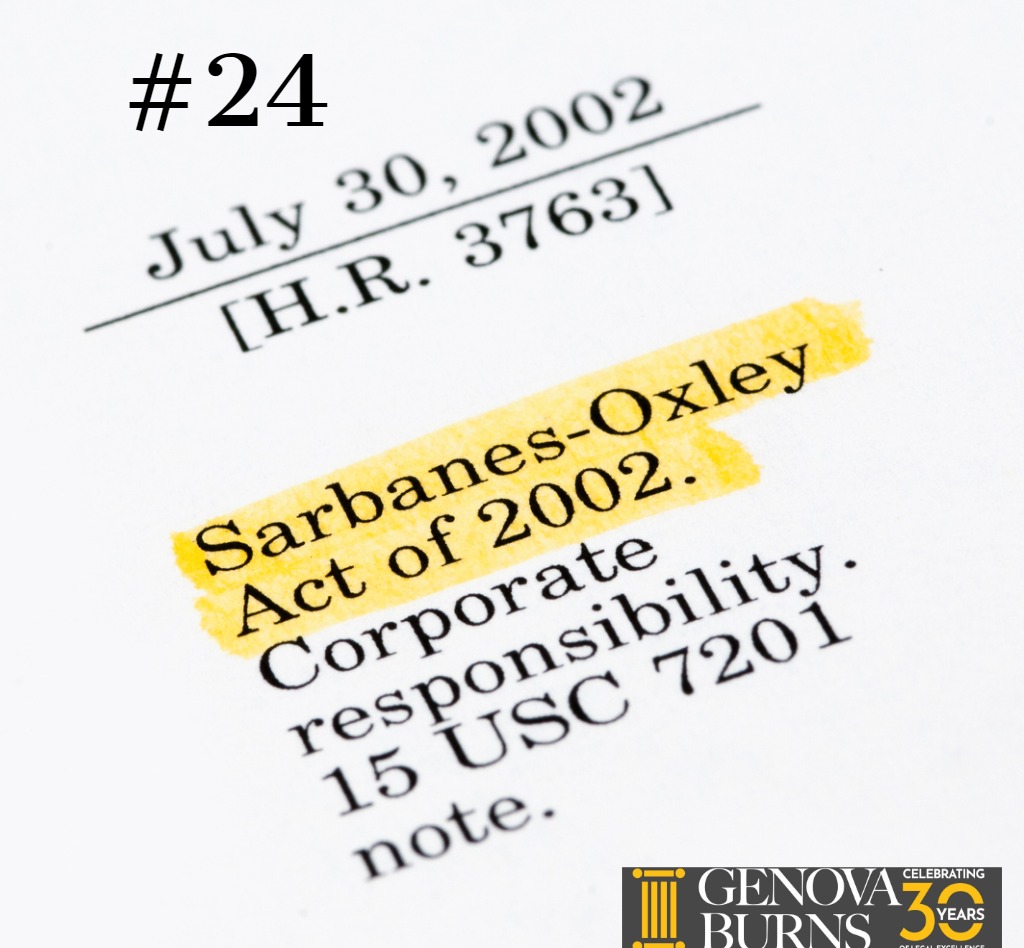#24 of Genova Burns’ Anniversary Countdown of the Most Influential Cases, Events and Laws in New Jersey
Sarbanes-Oxley Act of 2002
September 3, 2019
As Genova Burns celebrates its 30th anniversary serving the legal needs of clients throughout New Jersey and across the Northeast, we will be counting down the top 30 legal cases, events and laws that have left a significant impact on society, business, politics, and lifestyle here in the Garden State. Here is number 24.
The health of public companies and faith in the regulatory controls of the United States securities system has been strong for more than 15 years, leading to stronger public corporations, higher dividends for investors, and an overall more positive outlook for our country’s stock markets. This enduring confidence is due in part to the Sarbanes-Oxley Act of 2002, which helped restore faith in the way public companies are managed and operated through tighter scrutiny and regulation.
The Sarbanes-Oxley Act of 2002 (Pub.L. 107–204, 116 Stat. 745, enacted July 30, 2002) is a series of federal laws also known as the Public Company Accounting Reform and Investor Protection Act (U.S. Senate) and the Corporate and Auditing Accountability, Responsibility, and Transparency Act (House of Representatives). More commonly referred to as Sarbanes–Oxley, Sarbox or SOX, the Act sets forth requirements for all public company boards, management and public accounting firms, as well as partial applicability to privately held companies.
Overall, Sarbanes–Oxley has been widely applauded for nurturing an ethical approach to corporate management, forcing top managers to be transparent and employees to be responsible. “In the early 2000s, significant corporate management and accounting scandals, such as Enron, WorldCom and others, shook American confidence in publicly traded companies and the country’s securities system to the core. The Sarbanes-Oxley Act went a long way to control the elements that caused these corporate debacles and restore the faith of investors,” said Jeffrey R. Rich, Chairman of the Commercial Real Estate and Redevelopment Practice Group at Genova Burns. “This pivotal series of regulations continues to bring a level of transparency to the operations of public companies and has consistently prevented the financial collapse of many public corporations. This continues to engender confidence in stockholders and investors, and has put those who break its regulations on notice that tough penalties await.”
Regulatory Summary
The rules and enforcement policies under the Sarbanes-Oxley Act amended or supplemented existing laws dealing with security regulation, including the Securities Exchange Act of 1934 and other laws and regulations enforced by the Securities and Exchange Commission. The new law set out reforms and additions in four principal areas: corporate responsibility, increased criminal punishment, accounting regulation, and new protections.
The 11 sections of the Sarbanes-Oxley Act cover responsibilities of a public corporation's board of directors, add criminal penalties for certain misconduct, and require the Securities and Exchange Commission (SEC) to create regulations, as necessary, to ensure compliance. These sections, also referred to as titles, are:
• Public Company Accounting Oversight Board (PCAOB)
Title I established the Public Company Accounting Oversight Board to provide independent oversight of public accounting firms providing audit services, creating a central oversight board tasked with registering auditors, defining processes and procedures for compliance audits, inspecting and policing conduct and quality control, and enforcing compliance with Sarbanes-Oxley.
• Auditor Independence
Title II established standards for external auditor independence, in order to limit conflicts of interest. It also restricts auditing firms from providing non-audit services and consulting to the same clients.
• Corporate Responsibility
Title III mandates that senior executives take individual responsibility for the accuracy and completeness of corporate financial reports. It also outlines limits on the behaviors of corporate officers and describes specific forfeitures of benefits and civil penalties for non-compliance.
• Enhanced Financial Disclosures
Title IV outlines reporting requirements for financial transactions, including off-balance-sheet transactions, pro-forma figures and stock transactions of corporate officers. It calls for internal controls for assuring the accuracy of financial reports and disclosures, and requires timely reporting of notable changes in financial condition and enhanced reviews by the SEC, or its designee, of corporate reporting.
• Analyst Conflicts of Interest
Title V offers measures designed to help restore investor confidence in securities analysts, including a code of conduct for such analysts and the disclosure of conflicts of interest.
• Commission Resources and Authority
Title VI defines practices to restore investor confidence in securities analysts, including the SEC's authority to bar securities professionals from practice as a broker, advisor, or dealer.
• Studies and Reports
Title VII mandates the Comptroller General and the SEC to perform periodic studies and report their findings, in order to demonstrate consistent oversight of the implementation and enforcement of Sarbanes-Oxley and to demonstrate the Act’s ongoing effectiveness.
• Corporate and Criminal Fraud Accountability
Often called the Corporate and Criminal Fraud Accountability Act of 2002, Title VIII outlines specific criminal penalties for the intentional manipulation, destruction or alteration of financial records, material interference with investigations, as well as protections for whistle-blowers.
• White Collar Crime Penalty Enhancement
Also known as the White Collar Crime Penalty Enhancement Act of 2002, Title IX codifies the criminal penalties associated with white-collar crime and conspiracy and outlines strong sentencing guidelines for actions resulting from lack of compliance.
• Corporate Tax Returns
Title X requires that the Chief Executive Officer must sign the company’s tax returns.
• Corporate Fraud Accountability
Commonly referred to as the Corporate Fraud Accountability Act of 2002, Title XI categorizes corporate fraud and records tampering as criminal offenses and mandates specific penalties for such violations, while allowing the SEC to temporarily freeze transactions or payments that have been deemed “large” or “unusual.”
In 2005, Alan Greenspan, former Federal Reserve Chairman, praised Sarbanes–Oxley, “I am surprised that the Sarbanes–Oxley Act, so rapidly developed and enacted, has functioned as well as it has ... the act importantly reinforced the principle that shareholders own our corporations and that corporate managers should be working on behalf of shareholders to allocate business resources to their optimum use.”
For the complete text of the Sarbanes-Oxley Act of 2002, click here.
Tags: GENOVA BURNS LLC • Redevelopment • Commercial Real Estate • Jeffrey R. Rich, Esq. • Oxley • Anniversary Countdown


